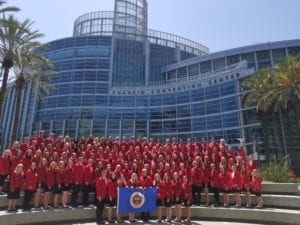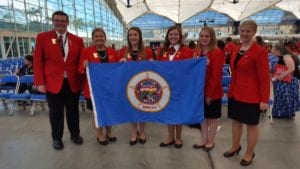Leadership Opportunities with Minnesota FCCLA
Ultimate Leadership Award Application
Link to Leadership Applications
Minnesota Family, Career & Community Leaders of America is a career and technical student organization functioning as an integral part of the family and consumer sciences curriculum operating within the middle and high school system. MN FCCLA is part of the national organization of Family, Career and Community Leaders of America, Inc. FCCLA emphasizes the three areas of peer education, leadership, and family by focusing on critical thinking and decision making skills. FCCLA realizes that all individuals have leadership potential and enables them to develop these abilities.
Minnesota FCCLA offers many leadership opportunities for members.
- Chapter Officers
- Area Officer Teams
- Peer Educator Teams
- State Officer
- National Officer Candidate
Student Leadership Challenge – Exemplary Leadership Traits
FCCLA utilizes the Student Leadership Challenge by James Kouzes and Barry Possner.
MODEL THE WAY
CLARIFY VALUES
Find Your Voice • Affirm Shared Values • Reflection and Action
SET THE EXAMPLE
Personify the Shared Values • Teach Others to Model the Values • Reflection and Action
INSPIRE A SHARED VISION
ENVISION THE FUTURE
Imagine the Possibilities • Find a Common Purpose • Reflection and Action
ENLIST OTHERS
Appeal to Common Ideals • Animate the Vision • Reflection and Action
CHALLENGE THE PROCESS
SEARCH FOR OPPORTUNITIES
Seize the Initiative • Exercise Insight • Reflection and Action
EXPERIMENT AND TAKE RISKS
Generate Small Wins • Learn from Experience • Reflection and Action
ENABLE OTHERS TO ACT
FOSTER COLLABORATION
Create a Climate of Trust • Facilitate Relationships • Reflection and Action
STRENGTHEN OTHERS
Enhance Self-Determination • Develop Competence and Confidence • Reflection and Action
ENCOURAGE THE HEART
RECOGNIZE CONTRIBUTIONS
Expect the Best • Personalize Recognition • Reflection and Action
CELEBRATE THE VALUES AND VICTORIES
Create a Spirit of Community • Be Personally Involved • Reflection
Sample-Meeting Agenda Form
Chapter Name: ______________________________________________________
Date: ________________________________________ Time: ________________________
Person Presiding: _____________________________ Leadership Position:___________________________
Type of Session:
__Business Meeting
__Work Session
__Special Meeting/Program
Opening Ceremony
Determination of Quorum/Attendance:
__Roll Call
__Sign In
Minutes
Treasurer’s Report
Committee Reports: Person scheduled to report:
1.___________________________________________________________________________
2.___________________________________________________________________________
3.___________________________________________________________________________
Unfinished Business:
1.___________________________________________________________________________
2.___________________________________________________________________________
3.___________________________________________________________________________
New Business:
1.___________________________________________________________________________
2.___________________________________________________________________________
3.___________________________________________________________________________
Program
Announcements
Closing Ceremony
Adjournment
FCCLA Officers use the FCCLA Planning Process
FCCLA offers tools to help members organize their projects.
Five Stages of FCCLA Program Involvement:
This concept is an organization tool to help you think about the types of activities to complete when implementing a program.
- Learn about the program and related issues
- Investigate specific needs, interests, and concerns in the local program, school and community
- Work with others if possible
- Plan and carry out projects that address the identified needs, interests and concerns
- Evaluate, share and report results
FCCLA Planning Process
This process is a step by step procedure to turn interests and concerns into actions.
- Identify Concerns-Brainstorm concerns, evaluate concerns, narrow to one workable idea
- Set a Goal-Get a clear picture of what you want to accomplish, write it down, evaluate it
- Form a Plan-Plan how to achieve your goal; decide who, what, where, when, why and how
- Act-Carry out project
- Follow Up-Evaluate project, recognize participants

 State Officer team is selected by a process of application, speeches, and interviews at the annual state conference. An application is available early in the year for candidates. State Executive Council meets together in June, July, September, November, and January each year. They are coordinated by the State Staff for state leadership of events and working together with a National Program with the regional officers and Peer Educators. State Officers present a roundtable workshops and speeches for Region Conferences and plan the State Conference.
State Officer team is selected by a process of application, speeches, and interviews at the annual state conference. An application is available early in the year for candidates. State Executive Council meets together in June, July, September, November, and January each year. They are coordinated by the State Staff for state leadership of events and working together with a National Program with the regional officers and Peer Educators. State Officers present a roundtable workshops and speeches for Region Conferences and plan the State Conference.
